English CBSE Class 10 NCERT First Flight Chapter 2 Nelson Mandela Free Solution of Extra Questions and Answers – Extract Based Questions Short Answer Questions Long Answer Questions and Value Based Questions
NELSON MANDELA
(Extra Questions)
Extract Based Questions


1. In which city the inauguration was held?
2. Which word in the extract mean ‘surrounded’?
3. On what day inauguration was held?
4. Who was sworn-in as president of the country on day of inauguration?


1. What is being referred to as disaster in above extract?
2. Who is speaker of above extract?
3. Which word in the extract is antonym of ‘ashamed’?
4. On that day, how many people took oath before the speaker of above extract? What were their designations


1. What is being referred to as ‘this’ in above extract?
2. What does the word ‘rainbow’ refer to in above extract?
3. Which word in the extract mean ‘a place’?
4. How many years a decade has?


1. Which oppression is being referred to in above extract?
2. What is being called as ‘this beautiful land’?
3. Which word in the extract is antonym of ‘shameful’?
4. What does ‘the sun will never set on so glorious a human achievement’ mean?
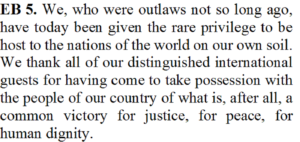

1. Who are being referred as ‘outlaws’ in above extract?
2. Which word in the extract is synonym of ‘special right’?
3. Please write synonym of the word ‘host’.
4. What is being refereed as a common victory?
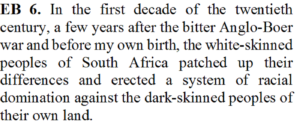

1. Which word in the extract is synonym of ‘installed’?
2. Which word in the extract is opposite of ‘friendly’?
3. In which decade of twentieth century did inauguration took place?
4. What was the colour of skin of Boer community?


1. Who is being referred as ‘my people’?
2. Which word in the extract is synonym of ‘very big’?
3. Who had created the policy of apartheid in South Africa?
4. Which word in the extract is synonym of ‘permanent’?
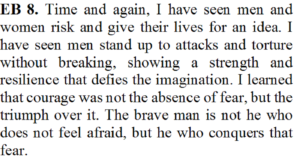

1. According to the extract what had defied imagination’?
2. How does narrator define courage?
3. Who is a brave man?
4. Which word in the extract is synonym of ‘victory’?


1. Which word in the extract is synonym of ‘temporary’?
2. In which city did narrator go later?
3. What types of freedom he later yearned for?
4. Was his meaning of freedom as a student same as that during childhood?
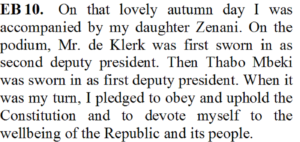

1. Which word in the extract is synonym of ‘welfare’?
2. In which city the ceremony was held?
3. For which designation the narrator was sworn in?
4. Who accompanied the narrator on that day?
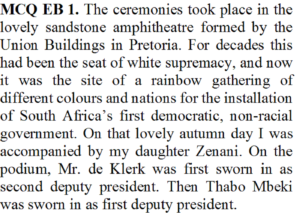

(i) In which city the ceremonies took place?
(a) South Africa
(b) Union Buildings
(c) Amphitheatre
(d) Pretoria
(ii) Who is the write of this extract?
(a) father of Mr. de Klerk
(b) father of Zenani
(c) father of Thabo Mbeki
(d) none of the above
(iii) How many deputy presidents were sworn in?
(a) first
(b) second
(c) two
(d) none of the above
(iv) Based on the extract please classify following as fact and opinion
- Ceremonies took place in an amphiteatre
- I strongly believe that one should not organize grand ceremonies
- The occasion was installation of first non-racial government of South Africa
- The season was certainly autumn
- No nations should have more than one deputy president
(a) F – 1,2,4 and O -3,5
(b) F – 1,3,4 and O- 2,5
(c) F – 2,4 and O – 1,3,5
(d) F – 1,3,5 and O – 2,4
(v) For how many years, ‘this had been the seat of white supremacy’ ?
(a) 10 years
(b) more than 10 years
(c) less than 10 years
(c) all the above
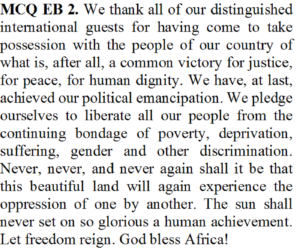

(i) Who is the author of the lesson from which above extract has been taken?
(a) Nelson Mandela
(b) Kamala Das
(c) Fredrik Forsyth
(d) Gavin Maxwell
(ii) From which of the following, the speaker does not talks about liberation of people
(a) deprivation
(b) poverty
(c) suffering
(d) liberty
(iii) Which of the following has not been described as achievement
(a) victory for justice
(b) victory for political affiliation
(c) victory for human dignity
(d) victory for peace
(iii)Based on the extract please classify following as facts and opinion
- it was a nice gesture that the speaker thanked guests
- the pledge should have been taken by all
- the speaker had the desire to free his country from oppression
- the guest had some other engagements so left soon
(a) F – 1,3 and O – 2,4
(b) F – 1,2 and O- 3,4
(c) F – 1,4 and O- 2,3
(d) F – 2,3 and O -1,4
(iv) An expression ‘We pledge ourselves to liberate all our people’ has been used in the extract. Which of the following is an incorrect use of ‘pledge’
(a) We pledge ourselves to serve all our people
(b) We pledge ourselves to elevate all our people
(c) We pledge ourselves to educating all our people
(d) We pledge ourselves to strengthen all our people
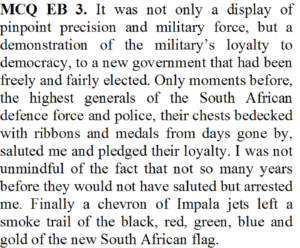

(i) The display had following meanings
(a) pinpoint precision
(b) military force
(c) military’s loyalty to democracy
(d) all the above
(ii) Which of the following is true about the highest generals
- they saluted the narrator
- they were wearing ribbons
- they forgot to wear medals
- their loyalty was doubtful
- earlier they could have arrested the narrator
(a) 1, 2, 5
(b) 2, 3, 4
(c) 1,3,4
(d) 3,4,5
(iii) Which of the following colour is not part of South African flag?
(a) gold
(b) green
(c) black
(d) brown
(iv) Which of the following word has been used in the extract to closely mean ‘forgotten’
(a) pinpoint
(b) unmindful
(c) bedecked
(d) chevron
Please arrange following activities in the order of their occurance
- Impala jets left a smoke trail
- Highest general of police saluted me
- display of pinpoint precision and military force
- Highest general of police arrested me
(a) 4,2,3,1
(b) 4,1,3,2
(c) 2,3,1,4
(d) 3,2,4,1
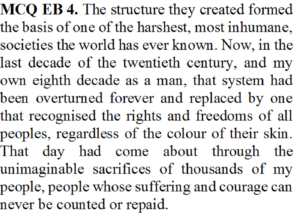

(i) In the line ‘The structure they created …’ the phrase ‘the structure’ refers to
(a) an iron structure
(b) system of discrimination on the basis of colour of skin
(c) a stone structure
(d) a strong structure
(ii) We can infer that age of the author at the time of writing this text was
(a) more than 70 but less than 80
(b) more than 80 but less than 90
(c) more than 60 but less than 70
(d) none of the above
(iii) What cannot be counted and repaid
(a) sacrifice of people
(b) suffering of people
(c) courage of people
(d) all the above
(iv) Based on above extract please classify following as fact and opinion
- Colour of the skin was basis of the old structure
- I am sure the world would have protested against the old structure
- I can easily infer that many people fought for the cause of black people
- People should something to respect those who sacrificed their life
(a) F – 1,3 and O -2,4
(b) F – 1,2 and O- 3,4
(c) F – 1,4 and O- 2,3
(d) F – 2,3 and O- 1,4
(v) An expression ‘the world has ever known’ has been used in the extract. Which of the following is incorrect use of ‘has ever’
(a) the world had ever understood
(b) the world has ever realised
(c) the world has ever become
(d) the world has ever grew
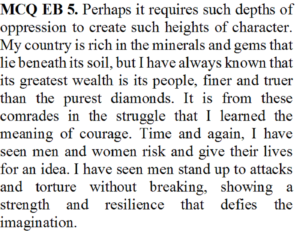

(i) According to what could be essential condition for emergence of people of highest character?
(a) depths of education
(b) depths of oppression
(c) depths of culture
(d) depths of bravery
(ii) Author feels following about his people
(a) they are the greatest wealth
(b) they are finer than purest diamond
(c) they are truer than purest diamond
(d) all the above
(iii) Country of the author is rich in
(a) minerals
(b) gems
(c) either (a) or (b)
(d) both (a) and (b)
(iv) Which of the following is true about men and women
- they had risked their life for an idea
- they had stood up to attacks
- they had stood up to appreciation
- they had stood up to torture
- they had shown strength
- they did not show resilience
(a) 1,2,4,5
(b) 1,3, 4,5
(c) 1,2,4,6
(d) 1,3,4,6
(v) The extract has used a phrase ‘time and again’. Which of the following is represents correct meaning of this prase
(a) one and all
(b) again and again
(c) never and never
(d) neck to neck
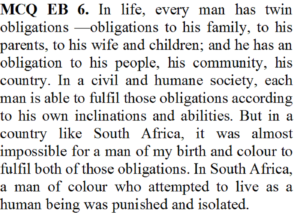

(i) According to author, every man does not have obligations to
(a) his is family
(b) his parents
(c) his people
(d) his livestock
(ii) According to the passage, in which country it was almost impossible to fulfil both obligations
(a) South India
(b) South Australia
(c) South America
(d) South Africa
(iii) According to passage, who could not fulfil his twin obligations?
(a) person of author’s friend
(b) person of author’s colour
(c) person of foreign origin
(d) person of native origin
(iv) Based on above extract, please classify following as fact and opinion
- in South Africa many people could not fill their twin obligation
- people of South Africa must have been under great stress
- in a civil society a person can fulfil his obligations
- some men of colour in South Africa were isolated
- people should have united for their rights
(a) F -1,3,4 and O -2,5
(b) F – 1,2,3 and O- 4,5
(c) F – 1,2 and O- 3,4,5
(d) F -1,2 ,4 and O – 3,5
(v) An expression ‘both of those obligations’ has been used in the extract. Which of the following is not correct use of similar expression.
(a) both of the doors
(b) both of these chairs
(c) both of these table
(d) both of these curtains
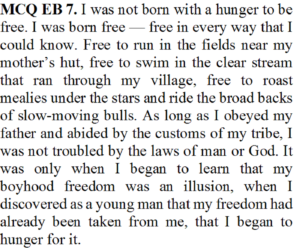

(i) Author initially thought that
(a) he was not born with a hunger to be free
(b) he was born free
(c) either (a) or (b)
(d) both (a) and (b)
(ii) The author was free to which of the following activities
- run in the fields near his mother’s hut
- free to swim in the clear stream
- disobey his father
- roast his mealies
- play with white people
(a) 1,2 and 3
(b) 2,3 and 4
(c) 3,4 and 5
(d) 4,1 and 2
(iii) Which of the following restriction author had during his childhood
(a) obey his father
(b) obey his mother
(c) follow customs of his tribe
(d) both (a) and (c)
(iv) Based on the extract please classify following as fact and opinion
- author was free to swim in clear stream
- author must have been a notorious boy during his childhood
- author later realised that his boyhood freedom was an illusion
- author, as a young man, began to hunger for freedom
(a) F – 1,2 and O- 3,4
(b) F – 1,3 and O -2,4
(c) F – 1,4 and O- 2,3
(d) F – 2,4 and O- 1,3
(v) An expression ‘as long as I obeyed my father’ has been used in the extract. Which of the following is not the correct similar ecpression
(a) as long as I respected my principal
(b) as long as I stayed in my house
(c) as long as I studying science
(d) as long as I used a pencil
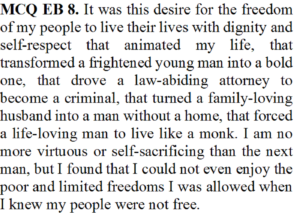

(i) What did the author desire most?
(a) freedom for himself
(b) freedom for his family
(c) freedom for his people
(d) freedom for all citizens
(ii) How did life of author change after he started working for freedom of his people?
(a) the desire for freedom of his people became goal of his life
(b) he changed from a frightened person to bold one
(c) he changed from law abiding person to a criminal
(d) all the above
(iii) Which of the following is not true about thought of the author
(a) he had more virtues than any other person
(b) his self-sacrifice was not more than the next man
(c) he was not more virtuous than the next man
(d) none of the above
(iv) It can be inferred from the abstract that earlier the author was
(a) a lawyer
(b) a teacher
(c) a soldier
(d) a monk
(v) Based on the extract please classify following as abstract and opinion
- freedom of his people became goal of the author
- author should not have changed his life so for sake of others
- author, being a leader, must have been wiser than his colleagues
- author had some freedom though limited
(a) F – 1,2 and O -3,4
(b) F -1,3 and O – 2,4
(c) F – 1,4 and O- 2,3
(c) F – 2,,4 and O- 1,3
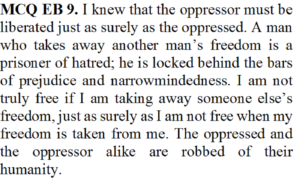

(i) Who according to author needs to be liberated?
- oppressor
- oppressed
- either (a) or (b)
- both (a) and (b)
(ii) A person who takes away someone else’s freedom is
(a) a prisoner of hatred
(b) locked behind prejudice
(c) locked behind narrow mindedness
(d) all the above
(iii) Under which of the following condition a person is not free?
(a) if one takes away someone else’s freedom
(b) if his freedom is taken away
(c) if he does not feel free
(d) both (a) and (b)
(iv) Who according to author is robbed ?
(a) oppressor
(b) oppressed
(c) either (a) or (b)
(d) both (a) and (b)
Short Answer Questions (30-40 words)


Answer: Owing to decades of oppression many people of great wisdom and courage emerged. It is from these people that Nelson Mandela understood the meaning of courage. Ultimately South Africa was freed from racial discrimination.


Answer: He knew that freedom was achieved through struggle and sacrifice of thousands of people who had died. It pained Nelson Mandela that he was not able to thank them in person and that they could not see outcome of their sacrifice.


Answer: He pledged to liberate all people from bondage of poverty, deprivation, suffering, gender and other discriminations. He said that this beautiful land will never again experience the oppression of one by another.


Answer: In all three persons were sworn in on 10th May. Nelson Mandela promised to obey and uphold the constitution and to devote himself to the wellbeing of his country and its people.


Answer: The salute by the generals of military and display of jets signified loyalty and support to the democratically elected government through free and fair elections.


Answer: According to Mandela the minerals and gems are not the true wealth of a country. The true wealth of a country are its people. They are finer and truer than the purest diamonds.


Answer: The desire for freedom of his people to live their lives with dignity and self-respect animated life of Nelson Mandela.
He was transformed from a frightened man into bold, from law abiding attorney to criminal, from family loving husband to a homeless and from life-loving person to a monk.


Answer: Mandela thought that an oppressor was a prisoner of hatred. He is locked behind the bars of prejudice and narrowmindedness. And the person whose freedom has been taken away is certainly not free.
Thus oppressor and oppressed both needs to be liberated.


Answer: Mandela said that courage was not the absence of fear, but the triumph over it.
He said that if people can learn to hate, they can be taught to love, for love comes more naturally to the human heart.


Answer: The desire for freedom of his people to live their lives with dignity and self-respect animated life of Nelson Mandela.
He was transformed from a frightened man into bold, from law abiding attorney to criminal, from family loving husband to a homeless and from life-loving person to a monk.


Answer: Mandela thought that an oppressor was a prisoner of hatred. He is locked behind the bars of prejudice and narrowmindedness. And the person whose freedom has been taken away is certainly not free.
Thus oppressor and oppressed both needs to be liberated.


Answer: Mandela said that courage was not the absence of fear, but the triumph over it.
He said that if people can learn to hate, they can be taught to love, for love comes more naturally to the human heart.


Answer: An oppressor troubles others because he is not free in his mind. He is himself a prisoner of hatred. He has locked himself behind wrong thinking. One does not have freedom if one takes away freedom of others.
Hence oppressor needs to be liberated.


Answer: Here ‘this’ refers to amphitheater formed by the Union Buildings in Pretoria.
White people had ruled South Africa for long time. Blacks did not have any right. Therefore author said “this has been the seat of white supremacy for decades.”
Long Answer questions (120-150 words)


Answer: During his childhood freedom meant being free to run in fields near his mother’s hut, free to swim in a stream, free to roast mealies and ride on bulls.
As a student he wanted freedom to stay out at night, read whatever he pleased and go wherever he liked. He had termed this as a transitory freedom.
Later he wanted the freedom to achieve his potential, to earn for his living, to marry and have a family. A freedom for not being obstructed in leading a lawful life. He termed these as basic and honourable freedom.
Then he slowly learned that freedom of every black person was curtailed. So meaning of freedom became freedom for all people. He understood that chain on any one person was chain on everyone and chain on everyone was a restriction on himself too. He wanted freedom for his people to live with dignity and self-respect.
Thus understanding of Mandela about freedom changed with age.


Answer: The inauguration ceremony was held on the occasion of installation of new government in South Africa. The new government was democratically elected through free and fair elections.
Since very long, South Africa had a system of apartheid. White supremacy was established in the country. The blacks were denied even the basic human rights. Blacks were not free to choose a profession of their choice. Doors of justice were closed for them.
The prolonged oppression brought about a struggle for equality. This was not a simple struggle. People were beaten and arrested. Many people lost their life.
Ultimately the freedom and equality was achieved. This is considered a big achievement for South Africa and also for the entire world. During the struggle, international community had withdrawn their support to South Africa. At the inauguration ceremony, world leaders reached Pretoria to pledge their support to new government.
Thus the inauguration ceremony represented a common victory for justice, peace and human dignity.


Answer: Freedom is of utmost importance to human beings. Its value cannot be perceived by a person who has never been deprived of it.
Freedom at childhood and early in the life is transitory state of freedom. Because one’s outlook and activities are limited to playing, reading and eating.
During later phase of life one needs to have freedom to realise his full potential and to lead a life of honour and respect. One would not like to be obstructed if he is leading a lawful life.
If such freedom is curtailed, it results into inhuman treatment and atrocities by one person upon another. Life of oppressed becomes without dignity.
Every civilized society needs to be built on the principle of equality and justice. This ensures dignity and opportunity to all. And when everybody prospers the whole society grows.
Hence freedom is a must to lead a life of dignity and for growth of humanity and civilization.
****
A TIGER IN THE ZOO
(Extra Questions)
Extract Based Questions


1. Who is referred as ‘he’ in above extract?
Answer: The tiger who is in the cage of a zoo
2. Which poetic device is used in ‘quiet rage’?
Answer: Oxymoron. Words ‘quiet’ and ‘rage’ have opposite emotions.
3. Please name the poem and write name of the poet.
Answer: ‘A Tiger in the Zoo’ is the poem. Leslie Norris is the poet.
4. Which word in the extract is synonym of ‘bright’?
Answer: Vivid


Answer: Plump
2. Why do you think a tiger would hide near a water hole?
Answer: Animals come there to drink water. A tiger can hunt these for his food.
3. What is the poetic device used in ‘where plump dear pass’?
Answer: Alliteration. The word ‘p’ is repeated.


1. How does a tiger terrorise villagers?
Answer: He snarls, at them. He shows his bare teeth and claws to scare them.
2. Which poetic device is used in ‘his white fans, his claws’?
Answer: Repetition. The word ‘his’ is repeated.
3. Where are houses situated?
Answer: Houses are situated at the edge of the jungle.
4. Which word in the extract is synonym of ‘scaring’?
Answer: Terrorising


1. What is tiger doing in the cage?
Answer: He is walking slowly in his cage.
2. What does the line ‘his strength behind the bars’ mean?
Answer: He cannot use his strength because he is locked in the cage. He is helpless.
3. Which poetic device is used in ‘he’s locked in a concrete cell’?
Answer: Personification. The tiger has been addressed as ‘he’.
Alliteration. The letter ‘c’ has been repeated.
4. Which word in the extract is synonym of ‘neglecting’?
Answer: Ignoring


1. What is the last voice at night?
Answer: It is the sound of last visitor of the zoo.
2. Why do cars patrol in the zoo?
Answer: Officials of zoo move in these cars for inspection of zoo.
3. Explain meaning of ‘patrolling’?
Answer: To repeatedly go around an area for checking
4. What does the tiger look at?
Answer: Tiger looks at the shining stars.
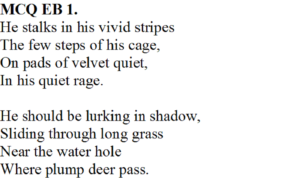

(i) Through ‘his quiet rage’ author means to imply that tiger is
(a) happy
(b) helpless
(c) worried
(d) reckless
(ii) Which of the following is not the attribute of his appearance
(a) vivid stripes
(b) pads of velvet quiet
(c) few steps of his cage
(d) his quiet rage
(iii) Which of the following activities tiger could do if he were in the woods?
(a) hide in the shadows
(b) hide in the long grass
(c) hide near a water body
(d) all the above
(iv) What difference does author want to project through these two stanzas?
(a) restriction and control
(b) limitation and infinity
(c) confinement and freedom
(d) regulate and resist
(v) Which poetic device has been used in the line ‘in his quiet rage’
(a) alliteration
(b) oxymoron
(c) metaphor
(d) simile
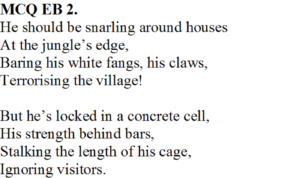

(i) What should the tiger not be doing?
(a) snarling around houses
(b) baring his white fangs
(c) barring the cell
(d) terrosrising the villagers
(ii) According to extract, where are houses situated?
(a) in the jungle
(b) in the cell
(c) at the edge of the jungle
(d) at the edge of the cell
(iii) ‘his strength behind the bars’ means that
(a) tiger is very week
(b) bars are very strong
(c) tiger cannot use his strength
(d) tiger is in front of bars
(iv) What is the poetic device used in ‘he should be snarling around houses’?
(a) metaphor
(b) alliteration
(c) personification
(d) anaphora
(iv) Which words as used in the extract mean ‘prison’?
(a) house
(b) cage
(c) cell
(d) both (b) and (c)
Short Answer Questions (30-40 words)


Answer: The tiger is locked in a small concrete cell.
He is a strong animal but cannot utilize his strength because he is locked in a cage. He becomes a helpless animal. This is the meaning of expression ‘his strength behind the bars’.


Answer: The tiger is locked in a small concrete cell. He is not a free animal. He cannot hunt for himself. He stares at the stars in the hope of getting free.
The tiger in the jungle is a free animal. He hunts for himself. He can use his strength and run around a lot. People are afraid of him. He is happy in the jungle moving around at his will.


Answer: Poet wants to convey that an animal kept in zoo is not happy. Its movements are restricted and he lives in an un-natural environment. Poet is advocating that it is cruel to keep animals in zoo.


Answer: Tiger walks very slowly and quietly in his cage. He is angry and feels hopelessness for being in the cage. He ignores visitors who come to see him.


Answer: He would lurk in the shadows of trees. He would hide and slide in the long grass. He would be waiting at the water hole to wait for fat dear to come to drink water.


Answer: The tiger is locked in a small concrete cell. His freedom has been snatched away. He is angry because of this. But he cannot do anything about it. He is helpless. Thus he expresses his rage quietly.
Long Answer questions (120-150 words)


Answer: Every living being wants to lead its life in its natural way. It would like to move, play and run around for pleasure and to keep healthy. It would like to mingle with species of its own for companionship. None likes to live alone in a confined space.
We can see the pain of being alone and being imprisoned in the eyes of animals kept in zoo. Such an expression can be witnessed in the eyes of birds kept in a cage.
Poet has very vividly narrated movements and life of a tiger kept in zoo. These have been compared with the freedom enjoyed by a tiger in jungle. We can easily appreciate the difference. One is confined, the other is free. One ignores its surroundings, the other enjoys. One is dependent for food, the other is independent and joyous.
Thus freedom means a lot to every living being.


Answer: Man has been using almost every animal for his advantage. Cows, buffaloes, sheep, hens, goats and other domestic animals are being reared to meet his requirements. As soon as these animals stop serving his needs, these are thrown out to fend for themselves. Worse, these are sold to slaughter houses.
Every day we see horse, ox, donkey and elephant pulling heavy loads. These animals are in a very poor physical condition. They may not even be fed properly. Many times these are beaten harshly.
Man has been hunting wild animals for pleasure. Man has assigned monetary value to remains of animals. Several species have become extinct.
We need to educate people about value system. They should be taught that animals too have life and needs to be loved. We need to have greater preventive controls to stop hunting of animals. Punishment needs to be very severe.
Probably through these means atrocities on animals can be reduced.
****


0 Comments